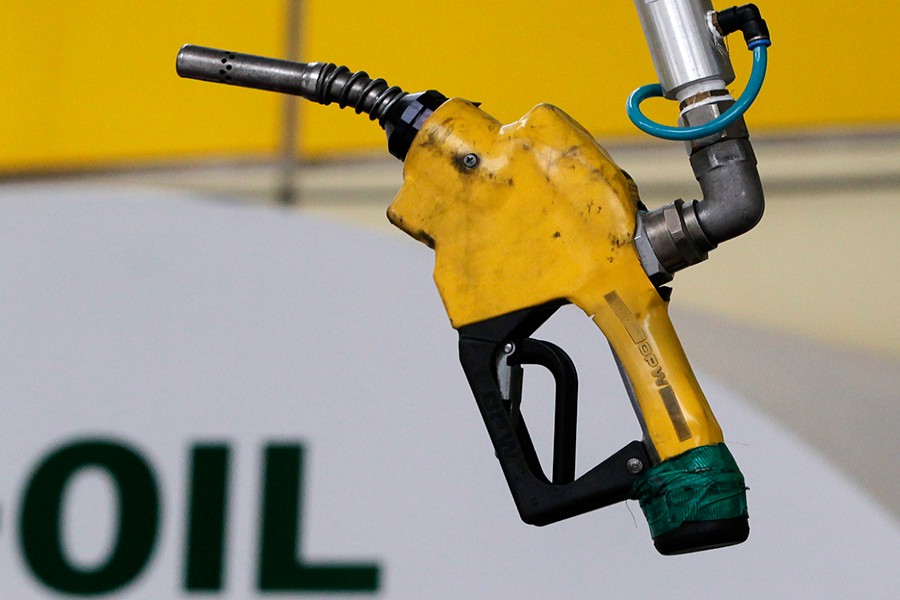The Bangladesh Petroleum Corporation (BPC) is set to send a proposal to power, energy and mineral resources ministry for a substantial hike in the prices of petroleum products.
It aims to avoid losses in oil trading due to the sky-rocketing oil prices in the international market.
"We're preparing to place before the energy and mineral resources division another proposal for a substantial hike in domestic oil prices," a senior BPC official said on Wednesday.
In February 2018, the BPC sought a 31 per cent rise in the price of per-litre furnace oil to Tk 55.
It also sought an 11 per cent rise in diesel and kerosene prices to Tk 72 per litre.
"This time, we are unlikely to suggest any specific hike, putting the responsibility on the authorities concerned," the official of the national oil entity told the FE.
The state-run BPC is currently incurring a loss of around Tk 270 million daily, according to the official.
The loss is nearly Tk 17 per litre for trading in diesel and Tk 15 for furnace oil, considering the global oil prices on October 02, he said.
Officials said the BPC's annual loss in oil trade would be roughly Tk 97 billion if the current oil prices in the international market remain unchanged.
The price of brent crude -- the benchmark in international oil price -- climbed to $84.88 per barrel on October 02 from $71 in January 2018.
It was $47 in June 2017 and below $30 in early 2016, according to official sources.
In February, the BPC was incurring a loss of around Tk 100 million daily and brent crude price in the global market was hovering around $70 per barrel.
The loss was Tk 9.80 per-litre furnace oil, Tk 5.24 for diesel and Tk 4.74 for kerosene, considering the January 2018 oil prices globally.
On April 24, 2016, the government cut per-litre retail prices of furnace oil, diesel, kerosene, octane and petrol to Tk 42, Tk 65, Tk 65, Tk 89 and Tk 86 respectively as global oil prices hit rockbottom.
The rates are still in effect in the domestic market.
After bagging hefty profits over the past three years since late 2014, the BPC started counting losses since November 2017 for rising prices globally.
Oil prices soared due to cuts in production by some major exporters coupled with international political turmoil-especially in the oil-rich Middle East.
The BPC made profits since September 2014 until October 2017 due to a slump in international oil prices, amid the Middle-Eastern uprisings.
It booked a profit of Tk 42.12 billion during fiscal year (FY) 2014-15, Tk 63.42 billion in FY '16 and Tk 43.99 billion in FY '17, according to BPC statistics.
The state entity paid Tk 22 billion in dividend to the state exchequers in FY '16 and '17.
It also paid dues worth Tk 30.90 billion to state-owned Sonali, Janata, Agrani and Rupali banks, Tk 17.58 billion to Petrobangla.
The BPC also paid Tk 6.03 billion as pending Value Added Tax (VAT) to the National Board of Revenue over the past several years from its profit.
Before that, it incurred a loss of Tk 23.32 billion in FY '14 and Tk 48.32 billion in FY '13.
In FY '12, the loss was Tk 113.71 billion, which was Tk 88.40 billion in FY '11.
It counted losses every year since FY '02 until FY '14.
The BPC imported 6.7 million tonnes of petroleum products, including diesel, jet fuel, furnace oil and octane, in FY '18.
In FY '19, the BPC might require to import around 7.5 million tonnes of different petroleum products.
It sought Tk 85 billion from finance ministry to foot oil import bills in FY '19.
Asked about the latest development, energy adviser of Consumers' Association of Bangladesh (CAB) Dr M Shamsul Alam protested the move to hike domestic oil prices.
"The accounting system of the BPC is still non-transparent and there are allegations of corruption against its officials," he told the FE.
Besides, the issue of hiking domestic oil prices should be dealt with by the country's energy regulator-Bangladesh Energy Regulatory Commission (BERC).
The BPC should place its oil price hike proposal to the BERC first, Mr Alam noted.


